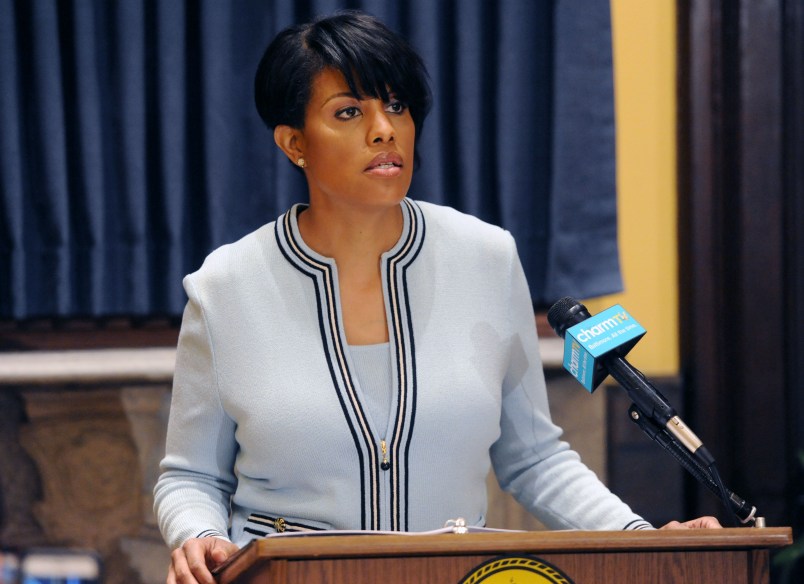BALTIMORE (AP) — The mayor called on federal investigators Wednesday to look into whether this city’s beleaguered police department uses a pattern of excessive force or discriminatory policing.
Mayor Stephanie Rawlings-Blake said even though complaints of excessive force and lawsuits alleging misconduct are down over the last few years, “we all know that Baltimore continues to have a fractured relationship between the police and the community.”
The mayor’s request came a day after new Attorney General Loretta Lynch visited the city and pledged to improve the police department, telling faith and community leaders “we’re here to hold your hands and provide support.”
Justice Department spokeswoman Dena Iverson said in a statement that Lynch had received the mayor’s request and “is actively considering that option in light of what she heard from law enforcement, city officials, and community, faith and youth leaders.”
Baltimore saw days of unrest after Freddie Gray, a black man, was taken into custody and suffered critical injuries. He died a week later. Protesters threw bottles and bricks at police during a riot on April 27, injuring nearly 100 officers. More than 200 people were arrested as cars and businesses burned.
A Baltimore Police Department spokesman had no immediate response to the mayor’s request. An email and text message was not immediately returned.
The mayor also said officers would have body cameras by the end of the year.
The Justice Department is already investigating whether Gray’s civil rights were violated, and six officers face charges in the arrest and death, ranging from assault to second-degree murder.
The new investigation the mayor called for is similar to one was done in Ferguson, Missouri, following the shooting of an unarmed, black 18-year-old man by a white police officer.
Such wide-ranging investigations look for patterns of discrimination within a police department. They can examine how officers use force and search and arrest suspects.
Baltimore City Council President Jack Young has been calling for such an investigation since October, his spokesman Lester Davis said.
“The only way we’re going to get the kind of lasting and meaningful reforms that are going to produce results is through a full-scale civil-rights investigation,” Davis said.
At the time the Ferguson inquiry was announced in September, it was described as part of a broader Justice Department effort to investigate troubled police departments and, when pervasive problems are found, direct changes to be made. The department said then it has investigated 20 police departments for a variety of systemic misconduct in the past five years, more than twice the number of cases opened in the previous five years.
The investigations can sometimes result in a settlement known as a consent decree, in which the department agrees to make specific changes, and an outside monitor is appointed to make sure the police force complies with the agreement.
The Justice Department reached a court-supervised agreement in 2012 with the New Orleans Police Department that required the agency to overhaul its policies and procedures for use of force, training, interrogations, searches and arrests, recruitment and supervision. In April, it issued a harshly critical report of the police department in Albuquerque, New Mexico, that faulted the agency for a pattern of excessive force and called for an overhaul of its internal affairs unit.
___
Associated Press writers Juliet Linderman in Baltimore and Eric Tucker in Washington contributed to this report.
Copyright 2015 The Associated Press. All rights reserved. This material may not be published, broadcast, rewritten or redistributed.







Real talk: she’s been awful the last couple of weeks.
Maybe she should look into whether Baltimore policing is discriminatory. Show some leadership.